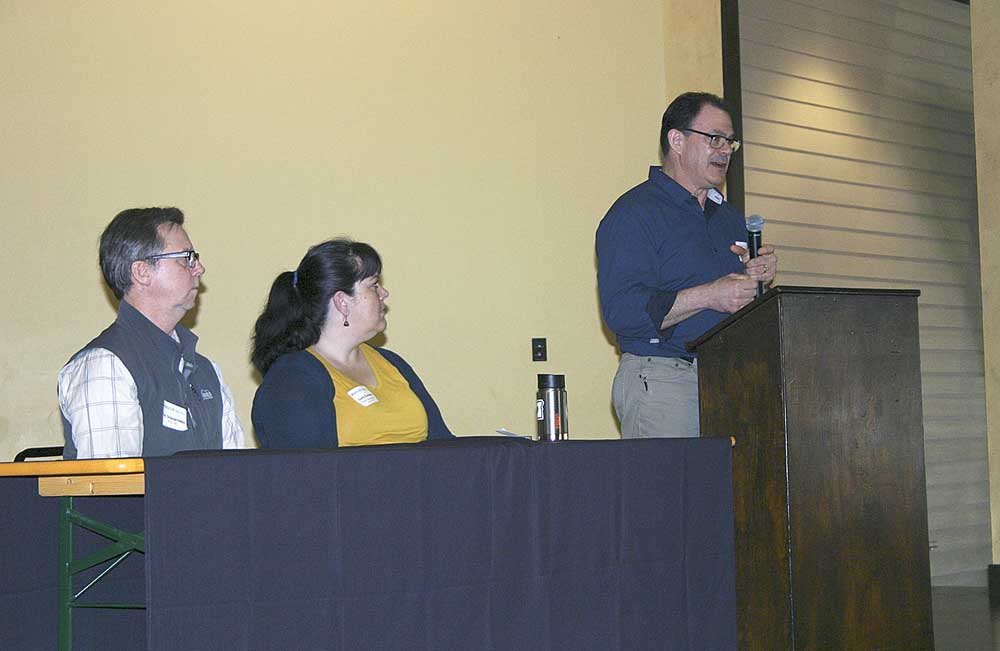Oregon hemp growers get a reality check
Published 9:00 am Thursday, February 20, 2020

- Gary Neuschwander, trade development manager for the Oregon Department of Agriculture, discussed upcoming trends for farmers during the annual SEDCOR Ag Breakfast onWednesday in Mt. Angel.
MT. ANGEL — Hemp may be the new “big crop” in Oregon, but Tim Shaughnessy warns it does not come without risks.
Shaughnessy is the managing owner of FSOil, part of Iverson Family Farms in Woodburn. The farm began growing hemp in 2016, and started FSOil to extract cannabidiol — or CBD — from the plants. CBD is commonly used to treat various ailments including pain, anxiety, seizures and muscle spasms.
Trending
Since the 2018 Farm Bill legalized hemp at the federal level, the number of licensed growers and processors like FSOil has skyrocketed in Oregon.
In 2015, there were 13 combined hemp growers and handlers, according to the state Department of Agriculture.
Last year, that number had ballooned to 1,961 growers and 597 handlers.
Some industry experts predict CBD sales in the U.S. could reach $20 billion by 2024, though Shaughnessy said it remains a perilous market for hemp growers. He joined a panel of speakers to discuss hemp and other trends in agriculture as part of the annual SEDCOR Ag Breakfast in Mt. Angel.
The biggest challenge, Shaughnessy said, is finding a buyer for the product after harvest.
“Everyone thinks they’re going to get rich in this, and that’s just not the case,” Shaughnessy said.
Trending
FSOil contracts to sell CBD oil to Charlotte’s Web, a company in Colorado. The farm also produces its own line of CBD-infused retail products, such as oils and creams, under the brand name Red Barn Hemp.
Hemp is a close relative of marijuana, though it contains just a fraction of tetrahydrocannabinol, or THC, the main psychoactive compound that gets users high. The USDA announced its interim hemp production rules late last year, intended to give growers clarity on testing protocols while opening access to programs such as crop insurance and farm loans.
Yet Shaughnessy said there is still uncertainty about banking, interstate commerce and “hot” fields, where hemp tests higher than the 0.3% THC limit. He also cautioned growers about signing processing contracts with potentially bad actors.
“There are a number of people who may offer you a contract to grow, and then may not honor that contract after you’ve harvested it,” Shaughnessy said.
Sunny Summers, cannabis policy coordinator for the Oregon Department of Agriculture, said regulators have their hands full trying to manage the state’s hemp program. So far in 2020, Summers said the department has received three times the number of applications as this time last year. ODA is seeking funding from the state Legislature for six new positions to handle the increased workload.
Summers said ODA has also submitted comments about the USDA production rules in search of more flexibility. In particular, she said a provision that would require all hemp testing be done solely at labs registered by the U.S. Drug Enforcement Administration could cause major problems.
“We currently have zero labs in Oregon with a DEA license,” Summers said. “Right there, we’re going to kill the industry if we can’t get some movement or change.”
Finally, Summers said the department is working across multiple agencies to ensure hemp growers are complying with regulations.
ODA has funded an assistant watermaster at the Oregon Water Resources Department to investigate water rights complaints in Southern Oregon, Summers said. Staff is also working with local law enforcement to help officers distinguish between hemp and marijuana transported across state lines.
“It looks like a duck. It quacks like a duck. (But) it might not be a duck anymore,” she said.
The Strategic Economic Development Corp., better known as SEDCOR, is a nonprofit economic development organization serving Marion, Polk and Yamhill counties. It hosts the Ag Breakfast to highlight trends in agriculture, which employs roughly 15,000 people in the three counties — more than 9% of local private sector jobs.







